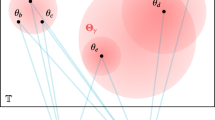Abstract
In this paper I explore alternative ways of answering the infinite regress problem of inference, as it was depicted in Lewis Carroll’s ‘What the Tortoise said to Achilles’. Roughly put, the problem is that if a claim to the effect that one’s premises give support to one’s conclusion must itself be part of one’s premises, then an infinite regress of reasons ensues. I discuss some recent attempts to solve that problem, but I find all of them to be wanting. Those attempts either require the reasoner to believe that her premises give support to her conclusion, or to take her premises to give support to her conclusion, where taking is not a doxastic attitude. I conclude that, on the face of the failure of those attempts to solve the problem, there is a strong prima facie case for allowing inference to be blind (in which case reasoners need not believe or take it that their premises give support to their conclusions).
Similar content being viewed by others
Notes
Some authors—-e.g. see Williamson (2007, p. 162) and Rumfitt (2008, p. 63)—have characterized the power we have to know logical truths be means of processes of suppositional reasoning of this type as some sort of byproduct of our more down-to-earth competence to handle doxastic input (to extract more information about the world from the information we already have). That we are equipped to infer that Some As are Bs on the basis of our belief that x is A and x is B means that we are also equipped to infer that If x is A and x is B then some As are Bs by going offline and exploring the consequences of our assumptions.
I thank an anonymous reviewer for calling my attention to this possible reply.
I thank an anonymous reviewer for this observation.
See Turri (2010, p. 317) for an example of a belief whose content is entailed by the reasons it is directly based on, but where the subject’s mode of reasoning is epistemically bad.
I thank an anonymous reviewer for pointing that out to me.
See Dogramaci (2013) for an example of a blind-reasoning view that would seem to receive support from the considerations I made here. Notice, however, that the way in which Dogramaci understands the notion of intuition (as a conscious temptation to believe something, which occurs also in perceptual experience) is very different from the way BonJour (2014) and other rationalists do.
References
Balcerak Jackson, Magdalena, & Balcerak Jackson, Brendan. (2013). Reasoning as a source of justification. Philosophical Studies, 164(1), 113–126.
Boghossian, Paul. (2003). Blind reasoning. Proceedings of the Aristotelian Society, Supplementary, 77, 115–248.
Boghossian, Paul. (2014). What is inference? Philosophical Studies, 169(1), 1–18.
BonJour, Laurence. (2014). In defense of the a priori. In M. Steup, J. Turri, & E. Sosa (Eds.), Contemporary debates in epistemology (2nd ed., pp. 177–184). Malden: Wiley.
Carroll, Lewis. (1895). What the tortoise said to achilles. Mind, 4, 278.
Dogramaci, Sinan. (2013). Intuitions for inferences. Philosophical Studies, 165(2), 371–399.
Dogramaci, Sinan. (2016). Reasoning without blinders: A reply to valaris. Mind, 125(499), 889–893.
Fumerton, Richard. (2015). What the internalist should say to the tortoise. Episteme, 12(2), 209–217.
Harman, Gilbert. (1986). Change in view. Cambridge: MIT Press.
McHugh, Conor, & Way, Jonathan. (2016). Against the taking condition. Philosophical Issues, 26(1), 314–331.
Railton, Peter. (2006). How to engage reason: The problem of regress. In R. Wallace, P. Pettit, S. Scheffler, & M. Smith (Eds.), Reason and value: Themes from the Moral philosophy of Joseph Raz (pp. 176–202). Oxford: Oxford University Press.
Rumfitt, Ian. (2008). Knowledge by deduction. Grazer Philosophische Studien, 77, 61–84.
Turri, John. (2010). On the relationship between propositional and doxastic justification. Philosophy and Phenomenological Research, 80(2), 312–326.
Valaris, Markos. (2014). Reasoning and regress. Mind, 123(489), 101–127.
Valaris, Markos. (2016a). Supposition and blindness. Mind, 125(499), 895–901.
Valaris, M. (2016b). What reasoning might be. Synthese, 194(6), 2007–2024. doi:10.1007/s11229-016-1034-z.
Williamson, Timothy. (2007). The philosophy of philosophy. Malden: Blackwell Publishing.
Wright, Crispin. (2014). Comment on Paul Boghossian’s “What is inference?”. Philosophical Studies, 169(1), 27–37.
Author information
Authors and Affiliations
Corresponding author
Rights and permissions
About this article
Cite this article
Rosa, L. Reasoning without regress. Synthese 196, 2263–2278 (2019). https://doi.org/10.1007/s11229-017-1535-4
Received:
Accepted:
Published:
Issue Date:
DOI: https://doi.org/10.1007/s11229-017-1535-4



